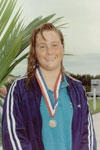 Cathy Burgess Hitchcock
Cathy Burgess Hitchcock
It is said that numbers do not lie, and the numbers – as well as achievements – Cathy Burgess Hitchcock posted over her swimming career make her the finest product Catawba County has produced from the pool.
From the ages of 8 to 16, Burgess captured a state championship in a variety of events, and in 1990 she grabbed titles in the 200 meter backstroke and 500 meter freestyle events and the Junior National Championships. During a distinguished high school career, Burgess was three times recognized as an All American, and she took her talent to the University of North Carolina where she was tabbed an All-Atlantic Coast Conference performer in each of her four years in the Tar Heels program.
It was during her collegiate career that Burgess was among 35 who were invited to the U.S. Olympic Trials in the 200 meter backstroke for the 1992 Barcelona games.
Upon her graduation from Chapel Hill, she became an assistant coach at Davidson College before moving on to the University of Kansas, where after serving as an assistant for three years was elevated to head coach of the women’s program in 2000. At age 27, Burgess was the NCAA’s youngest Division I coach.
Now the boys and girls swim coach at Hickory High, she has guided the Red Tornadoes to numerous conference titles and has been awarded with both boys and girls Coach of the Year honors.
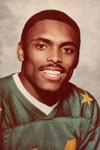 Charles Allen “Al” Young
Charles Allen “Al” Young
When discussion begins regarding the finest athlete Catawba County has ever produced, Charles Allen “Al” Young is a name that almost instantly leaps into the conversation. A three-sport star at Hickory High, Young went on to a standout collegiate career as a point guard at Virginia Tech. But the hardwood was hardly where he showed his tremendous talent.
On the gridiron, Young was named a high school All-American his senior season in rushing for over 1,300 yards and was listed as one of the top 100 players in the country in earning a spot on the North Carolina Shrine Bowl squad.
On the court, he earned honorable mention All-American honors and was a participant in the state’s East-West All Star game before moving on to Virginia Tech, where he started three of his four years and teamed with Dell Curry to form one of the nation’s most potent backcourts.
Today, he still ranks fourth on the Hokies career assists list with 468 and is sixth in career steals with 201.
A member of the Red Tornadoes track and field squad, Young earned allconference and all-state accolades, and upon completing his playing days at Virginia Tech he was drafted by both the San Antonio Spurs and New York Giants in 1985.
Now back in Hickory, Young has transformed from player to coach, working with various youth teams and organizations.
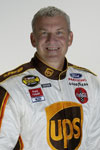 Dale Arnold Jarrett
Dale Arnold Jarrett
It has been said that the hardest shoes to fill may be those of a father. In the case of Dale Jarrett, though, the shoes left behind by one of NASCAR’s trailblazers were a perfect fit. Son of racing legend Ned Jarrett, Dale was a multi-talented athlete who decided to forego a golf scholarship to the University of South Carolina to follow the same career path of his father. And by the time his racing career had concluded, like his father he too could wear the moniker of NASCAR champion.
Cutting his teeth at the Hickory Motor Speedway, Dale soon became a charter driver in the Nationwide Series in 1982, and four years later he earned his first Series win at the Orange County Speedway in Rougemont. In 1987, he ran his first full season in the Nationwide Series while also taking part in 24 of 29 Sprint Cup races, and in 1991 he traveled down victory lane for the first time in the Sprint series with his win at the Michigan International Speedway. But it was 1993 when Dale rocketed to the top of the racing world when he outdueled Dale Earnhardt down the stretch to claim the first of his three Daytona 500 victories.
In 1996, he pocketed his second Daytona 500 win and one year later raised the champion’s trophy seven times in finishing second in the Cup driver standings. In 1999 Dale reached the top of the mountain, earning the Sprint Cup series championship as well as a piece of history. The championship put him and his father in elite company, joining Lee and Richard Petty as the only father-son duos to win the season-long title.
He began the 2000 season with his third Daytona 500 win, and when Dale retired in 2008 he did so piling up numbers that included 32 wins, 163 top-five and 260 top-10 finishes. Today, he is a NASCAR analyst for ESPN and ABC Sports, and he follows his father into the Catawba County Sports Hall of Fame.
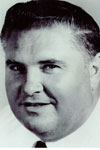 Richard-Howard
Richard-Howard
Many will recognize Richard Howard’s contributions in the world of slowpitch softball. What may come as a surprise, however, is the indelible mark he left in the NASCAR arena. For a 15-year period, his Howard’s Furniture- Western Steer softball teams and national championships were nearly synonymous.
During that stretch, Howard’s men’s teams were the gold standard in slowpitch softball, capturing 12 national championships while a women’s team he sponsored claimed a national crown in 1980. In 1973 a youth team sponsored by Howard also garnered a national title, and the unprecedented success has already earned him spots in four other halls of fame.
The Amateur Softball Association and United States Slow-Pitch Softball Association halls of fame have granted Howard membership, and the North Carolina chapters of both have welcomed him into their halls of fame as well. But many maybe surprised that as a pioneer in NASCAR, Howard’s efforts in the 1960s and ’70s were instrumental in the sport’s growth. Howard sponsored cars for drivers including Bobby Allison, Cale Yarborough and Bobby Isaac, with his cars grabbing 21 wins and 23 poles. In 1972, his car driven by Allison finished in runner-up position in the NASCAR season championship.
Howard served as president of the Charlotte Motor Speedway (now Lowe’s Motor Speedway) from 1964 to 1976, and in 1971 he was presented with NASCAR’s Myers Brothers Memorial Award as “the individual who did the most in the previous year to promote the growth of auto racing.”
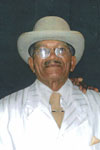 William (Skip) Beatty
William (Skip) Beatty
To those who participated in youth sports in the Newton area for the latter half of the 20th century, William “Skip” Beatty is an institution. Whether on the gridiron, the hardwood or the diamond, Beatty served as a coach and mentor for thousands of boys and girls who passed through the youth sports scene in eastern Catawba for more than 40 years.
No matter the skill or talent level, Beatty treated everyone who passed through his tutelage equally and with respect. Under his guidance, children who took part in football, boys and girls basketball, baseball and girls softball learned not only the fundamentals to achieve success in their respective sports, but also lessons in sportsmanship, respect and integrity that served to guide kids on and off the court for years to come.
| Age: 80 | |
| Career Highlights: | Boys Youth Football Coach 40+ years |
| Boys Youth Basketball Coach 40+ years | |
| Boys Youth Baseball Coach 40+ years | |
| Girls Youth Basketball Coach 40+ years | |
| Girls Youth Softball Coach 40+ years |
 For hotel and area information,
For hotel and area information, 